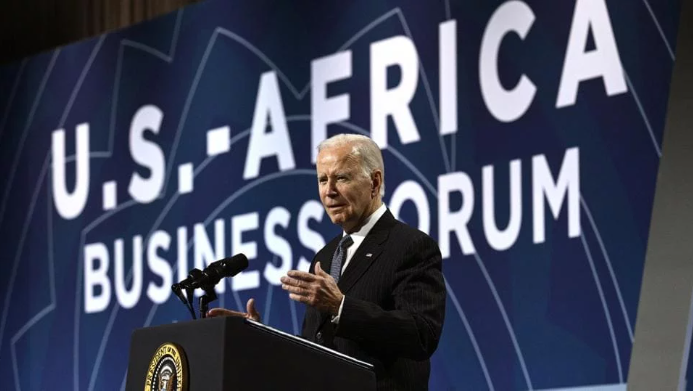The United States has announced an agreement aimed at bolstering trade ties between America and Africa after the continent had taken a back seat to other U.S. priorities in recent years.
The U.S. President, Joe Biden, made the disclosure on Wednesday, December 14, to African leaders who were present at a three-day summit in Washington.
According to Biden, “The United States is all in on Africa’s future.” When Africa succeeds, the United States succeeds. “Quite frankly, the whole world succeeds as well.”
Hence Biden’s remarks, as well as the summit, which is a major investment push by the United States to assert that America is a better partner for Africa than China. China has consistently grown its power over the past few years by funding infrastructure projects in Africa and other places, making it a leading player.
Chinese trade with Africa is about four times that of the United States, and Beijing has become an important creditor by providing loans with less stringent conditions than Western lenders across digital technology, transportation and other sectors.
Read also: WTO Charges African Nations to Adopt Digital Technology for Trade
The U.S. and Africa Collaboration Benefits
Biden said a new U.S. agreement with the African Continental Free Trade Area would give American businesses access to 1.3 billion people and a market valued at $3.4 trillion. He outlined companies that had made deals at the summit, including General Electric Co. (GE) and Cisco Systems Inc. (CSCO).
Delegations from 49 countries and the African Union, including 45 African national leaders, are attending the three-day summit, which began on Tuesday and is the first of its kind since 2014. It’s part of a renewed push to boost ties with a continent where China’s security ambitions and trade have challenged U.S. interests and investment, During the summit, Biden will talk about Africa and is likely to say that he wants the African Union to become a permanent member of the G20, which is a group of the world’s 20 largest economies. And lending drives. By contrast, Beijing has held its own high-level meetings with Africa every three years for more than two decades.
During the Summit, Biden is expected to show interest in African Union becoming a permanent member of the G20, which is a group of the world’s 20 largest economies.
As part of its long-term commitment to African leaders, U.S. companies announced more than $2 billion ($2.7 billion), led by technology deals.
The White House says that Biden will talk about how important Africa is, support a bigger role for the African Union, and give the region about US$55 billion in aid over the next year.
After making an early statement about training health workers, the White House said on Wednesday that the United States would give US$350 million and help raise US$450 million for digital development in Africa.
The increasing connectivity will make more options available for US businesses while also promoting social equality and economic growth, the White House added.
China has eclipsed the United States in the last 10 years in the area of investments in Africa, primarily through highly visible infrastructure projects that are frequently funded by loans that have reached a total of more than US$120 billion since the turn of the century.
Defense Secretary Lloyd Austin told leaders that China, as well as Russia, were “destabilising” the continent, noting that Beijing’s mega-contracts lacked transparency.
The Commerce Department on Thursday also targeted nine Chinese entities for allegedly seeking to support China’s military modernization, including Shanghai Micro Electronics Equipment (SMEE), China’s only lithography company. A total of 35 Chinese entities were added to the US trade blacklist, known as the “entity list,” as well as YMTC’s Japan-based subsidiary.
Thursday’s announcements weren’t all bad news for Beijing. The Biden administration removed Wuxi Biologics, a company that makes ingredients for AstraZeneca’s COVID-19 vaccine, and 25 other Chinese entities from the so-called unverified list thanks to successful site visits.
AfDB launches the African Pharmaceutical Technology Foundation
China’s Involvement in Africa’s Technological Advancement
Research institute ISPI 2021 report highlighted that China’s Information and Communication Technology (ICT) engagement with Africa dates back to decades ago, while Western nations just began paying attention to the continent.
The article explained how much of Africa’s digital infrastructure has been financed and constructed by China since the late 1990s.
Chinese companies, some of which are supported by the government, are increasingly well-positioned to create the digital ecosystems through which Africans interact, conduct business, make payments, and access public services after dominating markets through low prices.




